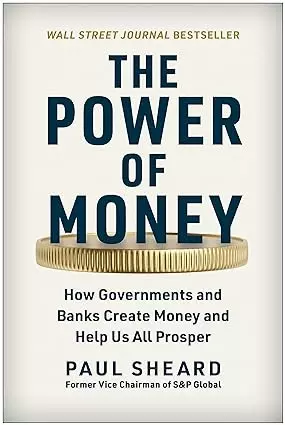The Power of Money:
Paul Sheard
"The Power of Money: How Governments and Banks Create Money and Help Us All Prosper", Paul Sheard
Paul Sheard provides a very lucid, very readable and well-explained account of how money really works in the economy. He eloquently dispels several powerful myths. All money is initially created rather than borrowed, and quintessentially is therefore not debt. Historically it was created in metal or paper, but now is largely created electronically, i.e. out of ‘thin air’, and thus with 100% seigniorage. Commercial banks create money when they make business or personal loans which are then accounted as customer debt. Central banks create money when they purchase government bonds in secondary markets. This is also accounted as government debt, but as Sheard shows, wrongly so, an error which has immense consequences.
Sheard appears to follow the MMT position that money is essentially debt, but that at the government level, it’s not really debt, not repayable or repaid (p38), and anyway is balanced by net surpluses in the private and overseas sectors, an identity due to Francis Cripps and Wynne Godley, but importantly a ‘post-hoc’ identity, not a simple direct flow (p50). Conventional accounting practice insists on equal liabilities and assets in the central bank’s balance sheet, despite the fact that ‘thin air’ cannot be accounted. When central banks create money to buy government debt, for example from a pension fund, that money is necessarily re-banked, some of it reaching back to the central bank, which is then said to have a debt on the same money it initially created! Not calling money debt in the first place would eradicate this nonsense.
There are some big consequences here that Sheard doesn’t fully draw out. Firstly, when government debt is held by its own central bank, which is owned by the same government (or in the case of the Fed is required to pay any surpluses to the US Treasury), then this is zero net debt. Arguments for austerity based on this debt therefore fail. Secondarily, the common prohibition on direct central bank money financing of government expenditure restricts the central bank to purchasing government debt only in the secondary market, thus creating huge risk-free gains for primary market traders. This is a scandal Sheard doesn’t mention. He explains how central banks use the interest rate to seek to control inflation (chapter 3), and points out the limits of this strategy when interest rates are already very low, but doesn’t fully critique monetarism for this reliance on the single tool of the price of money to manage the economy. The interest rate has several other effects, from reducing aggregate demand where people hold mortgages, to revaluing the currency, to affecting business investment costs.
Given Sheard’s leading executive position in global finance, it’s surprising that his clear and correct views have not challenged and replaced orthodox views of debt constraint amongst central bankers and politicians. In his account of the 2008 collapse of Lehman Brothers, where he argues Lehman should have been rescued, he acknowledges his role as global chief economist at the time but offers no acknowledgement of any responsibility. His account of the crisis is entirely monetary and doesn’t address the fundamental cause of deficient effective aggregate demand.
Sheard is clearly an extremely well-qualified financial expert. But when he ventures off-piste into social and ethical issues, he declines into superficial comment. This is particularly so in his chapters on inequality and the Euro. He defends huge levels of inequality as market efficient, with no reference to John Rawls or anyone else on social justice. Christ famously threw the market out of the temple, but for Sheard, the market is the temple. Like the MMT school, Sheard derides the Euro. Whether this is because it challenges the axiom that governments can create money in their own currency, or because the Euro threatens the dollar hegemony which Sheard celebrates, isn’t clear. He is correct to point out that the Euro makes the integration of monetary and fiscal policy more challenging, but as the EU and ECB have shown, this can be achieved, and the Euro works. His book would be more powerful if he had concentrated on his core expertise.
The book is available here.
Geoff Crocker
Editor ‘The Case for Universal Basic Income'
www.ubi.org

